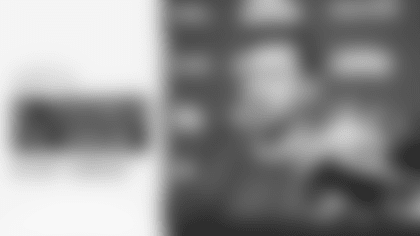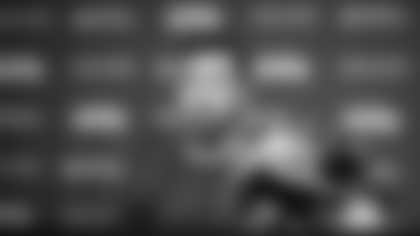Bobby Wagner stood in front of his locker following the Seahawks' Week 9 win over Tampa Bay knowing that while his team was victorious, the defense that he captains needed to be better.
"We have to do better," Wagner said not long after the Seahawks allowed 34 points and 418 yards in an overtime victory. We have to find a way to limit the points and limit the yards. We have the talent, we just need to put it together."
More disheartening to Wagner and the defense was that the subpar performance came right after a letdown in the second half of what could have been a blowout win in Atlanta the week before.
"I don't think anybody on this defense expected (Tampa Bay) to be able to move the ball the way that they did," Wagner said. "Especially with the way we didn't finish last week, to come out like that, we have to do better. We will be better… It's important for guys like myself, K.J. (Wright), all the other guys, to make sure the message is not missed."
A month later, with the Seahawks riding a five-game winning streak due in no small part to a much-improved defense, it's clear that the message was not missed.
The turnaround wasn't quite instant the following week, not with the 49ers quickly moving the ball down the field for a touchdown and a field goal on their first two possessions, but following those two drives, Seattle's defense has pretty dramatically changed the story of its season over these past three games. In the rest of that Week 10 win over the 49ers, San Francisco's offense managed just two field goal drives the rest of the game—San Francisco's other touchdown came on a fumble return—while turning the ball over three times.
Coming off of their bye, the Seahawks defense was even better in Philadelphia, allowing only one scoring drive—a field goal on a possession that started at Seattle's 43-yard line—until the Eagles managed to find the end zone with 2:03 left in the game and the Eagles trailing by two touchdowns. In between those scores, the Eagles punted three times, turned the ball over five times and turned it over on downs once.
Monday's win over the Vikings wasn't statistically as impressive as the previous two games, but overall it was a very strong performance by Seattle's defense. The Vikings moved the ball quickly for a touchdown on their opening drive, but that was largely the result of a couple of missed tackles that led to big gains. After that the Seahawks limited Minnesota to only a field goal in the second and third quarters while building a big lead, then conceded a long touchdown on a blown coverage, followed by another score in the final minutes. It wasn't a flawless performance for the defense, but it was another one that showed a lot of growth from how that unit was playing midway through the year.
The two most notable factors in Seattle's defensive turnaround—and these two things are very much related—have been an improved pass rush and an increase in takeaways. Over the past three weeks, the Seahawks have eight sacks and 26 quarterback hits, and they have recorded 11 takeaways.
"Yeah, we were all a little bit frustrated waiting for it to kind of click in where we're starting to make some things happen," Seahawks coach Pete Carroll said. "We gauge it by if we get the ball. That's such a factor in how we play. We've been a little bit quiet there for a bit. It's just kind of about the way you play. It happens. You create it and the opportunities come your way. You can make the most of it. It changes kind of the completion of the games and all. It really cranked up after that (Tampa Bay game) it seemed. If you want to put the label on it, you can. I don't know if it was that point or not. Certainly, we've been better since then."
There have been some rather obvious reasons for Seattle's improved defensive play, most notably the resurgent pass rush and the turnovers that came with it, as well as the addition of safety Quandre Diggs on the back end of the defense, but veterans like Wagner and Wright said some of it was just a case of players looking in the mirror and realizing they needed to be better as a collective group.
"That was definitely a game where you won the game but you didn't feel that way," Wagner said of the win over Tampa Bay. "Then when we had the 49ers game, we felt like we looked at each other and we kind of said, 'That's the standard, that's the way we need to play. That's where we're capable of playing and if we want to get to where we're going, we have to play like that.' I think everybody just made up their mind that that's how we're going to be and that's the defense we're going to be. That's the product that you've seen in these last few games, us just making a decision to be great, and understanding what that looks like, and what that is, and what it's going to take to consistently be great.
"Obviously you figure some things out (schematically), but at the end of the day you have to make a decision consciously that you want to be great. The scheme and all of that stuff can help but, at the end of the day you have to look yourself in the mirror and say, 'I want to be great.'"
Said Wright, "We started getting the ball out more, our pass-rush has gotten better. Our cohesiveness has really improved. It's just night and day from before. We just figured it out, it's a beautiful thing to see, and now we've just got to continue it."
In the spirit of trying to continue this level of improved play, Wright called the entire defense together following practice Saturday ahead of Monday's game against Minnesota, something he doesn't normally do, to remind his teammates that their recent success won't mean much if they can't keep it up.
"We've just got to make sure we capture this moment, because we can do something really special," Wright said when asked about the message he shared with his teammates. "It's human nature when you're doing well to get comfortable, and we have no room for that, so we've got to make sure we stay on it and keep emphasizing it."







